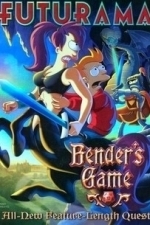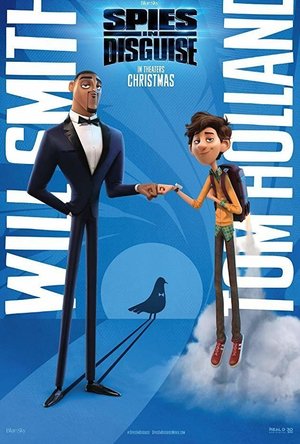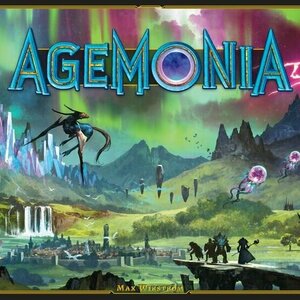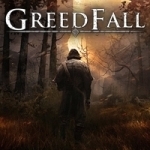
AirFighters - Combat Flight Simulator
Games and Entertainment
App
THE MOST ADVANCED FIGHTER PLANE COMBAT AND FLIGHT SIMULATOR Plan your tactical missions and start...

Soul Hunters - Assassin's AGE
Games
App
Welcome to a world of Holy Paladins, Deadly Dragons, Evil Wizards and over 50 other playable heroes!...
Gareth von Kallenbach (980 KP) rated Futurama: Bender's Game (2008) in Movies
Aug 14, 2019
This time the film starts out as a standard episode rather than continue the events of the past film. In true Futurama style, there are references to past characters and pop culture gags throughout. The early focus of the story is on the Dark Matter fuel shortage that is controlled by the greedy Mom and her corporation. Mom insists that prices are way up so she has to charge more for the precious starship fuel, but avoids any questions related to her record profits related to the ever rising fuel prices.
With the rising fuel costs the Planetary Express Office, is put on a very strict flight schedule that causes havoc amongst the crew. Fry (Billy West), still drifts aimlessly about life, Amy (Lauren Tom) is as shallow as ever and Leela (Katey Sagal), has an ager issue and is outfitted with a shock collar that jolts her whenever she loses her temper.
Bender (John Di Maggio), has a larger issue as he spots some of the staff children and their friends playing Dungeons and Dragons and wants to be a part of the action. It is learned that robots were not built for imagination so when Bender takes up the game and becomes the entity Titanius, he soon has a hard time distinguishing between reality and fantasy. Combine this with Leela’s entry of the Planet Express ship into a Demo Derby and you get a premise ripe with laughter.
The story shifts into high gear when Professor Farnsworth (Billy West), decides to use his anti-backwards crystal to end his old flame Moms hold on the fuel industry. The Crew make a startling discovery as they battle mom, and thanks to the power of the crystal and Bender, find themselves in a strange medieval world where each of them has new identities in this alternate universe.
In a race against time, the Planet Express staff must not only survive the alternate universe, but defeat Mom and her plans for universal domination.
With sharp picture and sound, this is a very enjoyable new adventure for fans.
There are loads of extras which include deleted scenes, commentaries, and a look at the next film “Into The Wild Green Yonder”.
All in all a welcome and satisfying film that should delight fans and help keep us happy until the new film arrives next year.

Ace Fishing: Wild Catch
Games and Entertainment
App
Journey to the world's most beautiful destinations and fish for real in paradise! Jump into...
BankofMarquis (1832 KP) rated Spies in Disguise (2019) in Movies
Dec 7, 2020
This studio has delivered solid animated outings with such fare as ROBOTS, HORTON HEARS A WHO, RIO and FERDINAND (along with the myriad of ICE AGE films) and their latest feature - 2019's SPIES IN DISGUISE - is no exception. I was pleasantly surprised by the fun, action, comedy and suspense of this film and was entertained throughout.
Blue Sky, of course, IS the "poor little sister" to the "Big 2" and it shows in some of their casting choices. Where I thought vocal work was being done by Tina Fey and Holly Hunter, I soon discovered that it is Rachel Brosnahan and Reba Mcintyre - not shabby at all, but not quite the "A" team either (it's like you are listening to the Broadway replacement actors for the Original Cast).
That is probably because they spent all of their casting money on the 2 leads - Will Smith and Tom Holland - and they are TERRIFIC together. Unlike Holland's lackluster (and lack of chemistry) turn with Chris Pratt in the PIXAR film ONWARD, Holland and Smith work well together in this film and I enjoyed their interactions with each other. Of course, Will Smith is in a league of his own when it comes to charming, cocky adventure hero with raw emotions and a soul - and that is EXACTLY what his character is and it works very, very well. Add to that Holland's riff on his Spiderman Peter Parker character - a scientific genius who is socially awkward and we have a fun duo to root for throughout this film.
Other outstanding voice talents in this cast include Masi Oka (who's voice would be terrific in just about ANY animation film), Rashida Jones, Karen Gillen and the always good Ben Mendelsohn as the villain.
Directors Nick Bruno (in his Directorial debut) and Troy Quane (in only his 2nd Animated outing) do a professional job keeping the plot moving, the fun brewing and the plot and action scenes simple and easy to follow (an easy thing to screw up) and this makes SPIES IN DISGUISE a very fun escape for an hour and 42 minutes.
Letter Grade: B+
7 1/2 stars (out of 10) and you can take that to the Bank(ofMarquis)

Digimon Heroes!
Games, Entertainment and Stickers
App
Collect and Battle Your Ultimate Digimon Heroes! Digimon Heroes is an exciting free-to-play Card...

Planescape: Torment
Games
App
Reviewers say: "Planescape: Torment is a wonderful game, and its Enhanced Edition is a splendid,...
Gareth von Kallenbach (980 KP) rated Greedfall in Video Games
Oct 31, 2019
Greedfall is a beautiful game, taking place in large expansive cities reminiscent of Paris or London in the 18th century and the lush forest landscape of Teer Fradee. Each character is costumed in what could only be considered French Musketeer and the island natives’ representative of what early European settlers in North America must have encountered. The sense of scale between the massive cities, and the vast expanse of the frontier provides a sense of openness that rival many other titles.
It’s this sense of openness however, where Greedfall initially stumbles. Much like games such as Dragon Age, the illusion of an open world environment is regularly halted by “invisible” walls that impede your progress. Looking through a small grove of trees you see your objective but are unable to pass through them directly. Instead, you must follow the path and climb a rock ledge to reach it. Several times while attempting to get to my highlighted objective, I’d get stuck on small bushes, or my path stopped by what should be easily passable brush. There are moments where it’s uncertain whether or not I could pass through the environment, so I’d have to refer to my map to see if that was the correct path, or I had to follow some other indirect route to get there. While this game style is hardly new (and had been common in the past until advancements in both computing power and storage space allowed for larger environments) the inconsistencies of what was passable and impassable lead to a bit more frustration then it should.
Combat is quick and easy to pick up with a light and heavy attack and a block or dodge for defense. Each successful attack also builds up your fury meter which allows for stronger strikes against enemy opponents. You and your opponents also benefit from armor and health attributes. Armor can help defend against health damage, but once the armor is depleted there is little standing between you and certain death at the end of a musket or blade. Numerous spells and potions can be used to buff up your character, cause elemental damage or provide quick healing when needed. Besides swords, maces and axes there are also an assortment of pistols and rifles for ranged attack. If you so choose, you can also create magic wielding warriors who can utilize spells and magic rings in combat as well. Various skill points can be added to your offensive and defensive capabilities that allows for stronger strikes, better mobility (unlocking the ability to roll away from danger is something that I highly recommend) and increase the length of spells.
The story and character voice acting is typically top notch, the one glaring exception to this was the accent used by the natives. As much as I hoped I would get used to it, the worse it tended to get. While creating an accent that is supposed to be unique to the people who share it should be applause worthy, it often felt forced and in most cases entirely TOO artificial. The cut scenes that are used throughout to further along the story are outstanding, and while the facial expressions generally left a lot to be desired, it didn’t detract too much from what was being said. The amount of voice acting and cut scenes puts it on par with far larger budget titles and outside of those few gripes feel they are done well overall.
Technically the game tends to suffer from some annoying and immersion breaking problems. While I played the game using a Nvidia GTX 2080 Super, there were times when the frame rates would drop from the typical 80+ on my ultra-wide screen down to 15 or 20. These slowdowns didn’t last long but seemed to come at times I wouldn’t have expected them. In my attempts to isolate them, I tried lowering a number of the graphical settings, but in most cases, it didn’t seem to have much effect. These have improved somewhat with the latest patches to the game, but still exist from time to time. There are also the random crashes to desktop for no reason at all, thankfully the game autosaves frequently enough (and allows you to manually save as often as you wish) that I never lost much progress when these occurred, but it’s something to be aware of. Characters and animals occasionally get stuck on the environment, I one time found myself stuck in a small hole that I should have easily been able to walk out of, and another time a large deer was stuck running in place next to a large rock. While these glitches didn’t cause any serious quest ending problems, they are just additional polish issues that still need to be worked out. As other reviewers have pointed out, there are some issues going from light to dark environments where it seems to take awhile for the lighting to adjust as it should.
Greedfall even with the inconsistent accents and technical difficulties is still an easy game to recommend for folks looking for a change of pace from the standard Dungeons and Dragons tropes. There is plenty of political intrigue and mysteries to unravel on Teer Fradee and no one faction that can be singled out as good or evil. Sacrifices have to be made when dealing with each faction and doing something for one will almost always cause a conflict with another. While the choices you make, do impact how others see you, they aren’t as world changing as they could have been. Greedfall is a long game easily 40+ hours depending on how many side quests you choose to complete on your search for a cure and it tells an interesting enough story to keep you engaged throughout.
What I liked: Interesting factions, Beautiful scenery, Unique setting
What I liked less: Invisible walls, Technical glitches, Inconsistent voice acting
Gareth von Kallenbach (980 KP) rated the PC version of Mortal Shell in Video Games
Oct 8, 2020
Mortal Shell is an “souls-like” action role playing game, where you are a creature whose unique ability is to inhabit the bodies of fallen warriors scattered across the realm of Fallgrim. Much like its inspiration, Fallgrim is a land that is bleak and unforgiving. Whether you are traipsing across murky swamps, filled with bear tramps and poisonous frogs, snowy fields or fiery plains, there are always an unending supply of enemies that you must contend with. Each “shell” you inhabit offers up a distinct playstyle and upgrade tree that should appeal to every unique player.
The first shell you inhabit, is what I refer to as the Jack-of-All trades shell, Harros. Harros is a traditional knight like character that has a balance of health, stamina, and resolve (the statistic that allows you to use your special upgrades applied to your weapon of choice). As you progress through the story, you will come across three other shells for you to inhabit, that you can switch between as you wish. This allows you to vary your play style between Eredrim, a tank-architype with lots of health but low stamina, Tiel, the acolyte with less health but is more agile and able to dodge and roll out of the way, or Solomon, who has the most resolve. Each character upgrade requires Tar (the gold of Fallgrim) and Glimpses. These are acquired by defeating enemies, and through gathering various plants throughout your journey.
In addition to the four shells, there are also four upgradable weapons that can be found along your journey. You begin with the Hollow Sword but will come across others to aid you on your quest. There is the Hammer and Chisel, a dual wield, fast attack, but lower damage weapon. The Martyr’s Blade, a heavy two-handed sword that does massive damage but is slow to attack. Lastly, The Smoldering Mace. All of these can be upgrades with special attacks that are initiated by your characters resolve, that can do an incredible amount of damage when initiated.
Combat occurs by locking onto your opponent and then utilizing fast and heavy attacks to defeat them. Experimenting with executing fast and heavy in specific sequences will result in numerous combos that do additional damage and stagger your foes. Mortal Shells unique blocking ability is what the game refers to as Hardening. Hardening, does exactly as the name suggests, turning yourself into stone and blocking most incoming attacks. It can be initiated at practically any time, even during the middle of your attack, allowing you to brush off an incoming attack and finish up with an epic strike. Learning the best time and place to use your hardening skill, is the key to overcoming your most difficult opponents, and ultimately slaying them in the process. There is also a parry aspect, which you obtain at the beginning of your quest, that allows you to parry incoming blows, and respond with devastating effect. Be aware that not all attacks can be parried, and your Tarnished Seal Emblem (which enables your skill) will glow red to warn you of this.
During combat, if your health reaches zero, you will be pushed out of your shell (which reminded me of playing a mech game where your mech is destroyed and you are automatically ejected). You are given the chance to climb back into your shell, but if you are hit while outside of your shell you will almost always die quickly. If your health reaches zero again, you die and you return back to Sester Genessa, a shadowy figure who acts like a bonfire from the souls’ games. As with the games before it, dying forces you to drop your tar and re-spawns all enemies that you have killed previously. Returning to your body allows you to retrieve your tar and restores all your health.
One of the more interesting aspects of the game is in the use of items you discover during your adventure. Most items effects will be unknown until you use the item, which forces you to experiment with everything you find. As you use the item more frequently you become more familiar with the item, and as that familiarity grows, the effects grow as well. Some will damage you in the beginning, only to benefit you as you grow more familiar with them, others you will utilize at the wrong time, and not benefit from the effect, but you will still learn from the experience. In this way Mortal Shell rewards you for experimentation, and forces those who like to hoard their findings for “when the right time arrives to use it” to utilize it and learn from it.
Much like the Souls-like games that inspired it, Mortal Shell could almost be mistaken for one of the games it garnered inspiration from. The setting, the characters, even the fonts used, could easily have been taken directly from a Dark Souls game. You’d be forgiven if someone came up to you and asked you which of the Dark Souls games you are playing. That’s not to say that Mortal Shell doesn’t distinguish itself in other ways, but on the surface, it would be easy to mistake it for another clone. The sound design, the graphic design, is all very well done, so at least the inspiration is put to good use in Mortal Shell
While Mortal Shell generally plays fast and well, there are a couple of instances where death seemed to come due to little I had control over. There are various cut scenes where you are crawling through tunnels, and you come out on the other side. Occasionally your character will be attacked immediately follow the cut scene, which gives you little time to react. There are ways to time your crawl, as to not emerge immediately into a group of baddies, but nothing frustrated me more, when I came across these areas. The difficulty and learning curve are about as difficult as one would expect from such a game.
If you are a fan of Dark Souls or Souls-like games, there is a lot to like in Mortal Shell. Most of the gameplay and style will feel immediately familiar, and there is just enough uniqueness in the game to satisfy veterans of the soul’s type games. If you have been put off by the difficulty of souls-like games in the past, Mortal Shell doesn’t differ enough from the formula to likely change your mind. While it’s not as long as the games that inspire it, it’s hard to beat the price ($29.99 on the Epic Store), and it’s refreshing enough to act as a place holder until the Demon’s Soul remake becomes available
What I liked: Beautiful Scenery, Hardening Skill can save you when you screw up
What I liked less: No real direction on where to start




